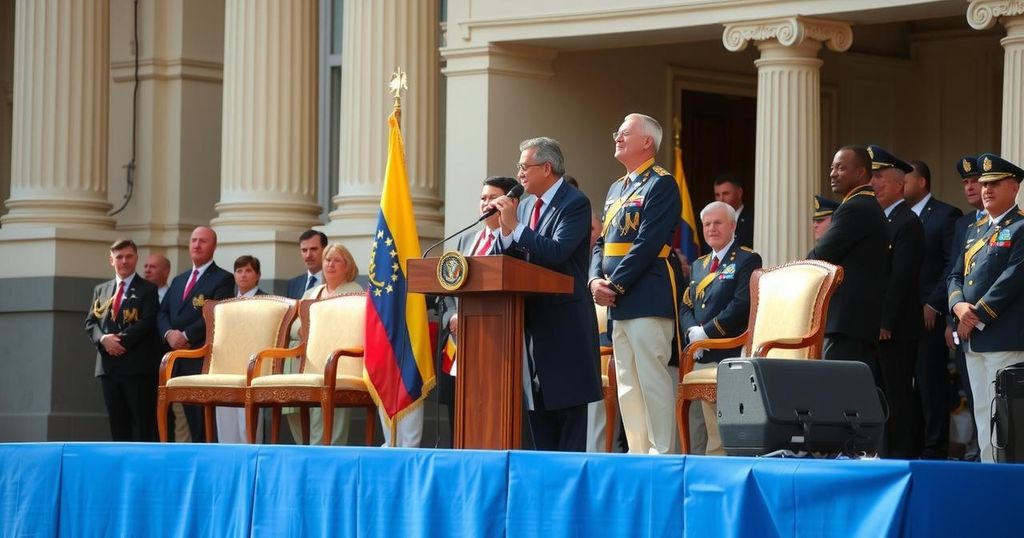Maduro’s Swearing-In Amid Allegations of Electoral Fraud

Nicolás Maduro commenced a disputed third term as president of Venezuela, claiming a fraudulent electoral victory amid significant opposition support for González, the recognized president-elect. The election has been labeled as a major fraud, prompting international condemnation and raising alarms regarding democracy in Latin America. Despite governmental efforts to suppress dissent, independent verification suggests a strong opposition following and challenges to Maduro’s legitimacy.
On Friday, Nicolás Maduro was sworn in for a third term as Venezuela’s president, marking the continuation of his contentious leadership after allegedly winning an election that many observers deem fraudulent. While this is not the first instance of Maduro assuming office under questionable circumstances, it is the first time that the opposition has presented evidence reportedly confirming their claim of having won the election. Allegations suggest that the voting results were manipulated, with receipts collected by opposition members indicating that challenger González defeated Maduro significantly. This incident, described by critics as possibly the largest electoral fraud in Latin American history, raises alarm about the state of democracy in the region.
The election results have led significant international figures to recognize González as Venezuela’s legitimate president-elect, thus garnering support from multiple countries. However, the Maduro government has taken steps to suppress dissent, including closing borders and issuing threats against González. The geopolitical landscape around this situation is complex, particularly with U.S. leadership changes happening concurrently, as previous administrations adopted a starkly different approach towards Venezuela’s governance. The Biden administration’s recent attempts to negotiate and establish free electoral conditions with Maduro were ultimately fruitless; similar harrowing circumstances continued plagued by further opposition suppression and fraud allegations.
Despite the challenges faced, the Venezuelan opposition, led by González, demonstrated resilience, managing to consolidate significant support that reflects a strong discontent with Maduro’s regime. Notably, independent observers like the Carter Center have validated the opposition’s voting receipts as legitimate, reinforcing claims of Maduro’s electoral defeat. This ongoing power struggle underscores the dire implications for democracy, not only within Venezuela but across Latin America, raising questions about the future of governance in a region increasingly threatened by authoritarian rule.
Nicolás Maduro has been a contentious figure in Venezuelan politics, often characterized by allegations of electoral misconduct and authoritarian governance. His tenure has been marked by severe economic decline and a humanitarian crisis, leading to mass migration and civil unrest. The backdrop of the current situation includes a geopolitical struggle with the United States and regional actors, given the U.S. had previously recognized opposition figures as interim leaders amid sanctions and international diplomatic measures implemented against Maduro’s administration. The push for democratic processes in Venezuela is further complicated by the dichotomy between the ruling regime and opposition supporters who seek change.
In conclusion, Nicolás Maduro’s swearing-in for a third presidential term amidst allegations of electoral fraud and a lack of legitimate support raises critical concerns about the state of democracy in Venezuela. With international recognition of opposition leader González as the rightful president-elect, the political climate remains charged as Maduro’s regime grapples with increasing illegitimacy. The implications of these developments extend beyond Venezuela, prompting cautious scrutiny among global leaders regarding engagement strategies in addressing autocratic regimes in the region.
Original Source: www.washingtonpost.com







